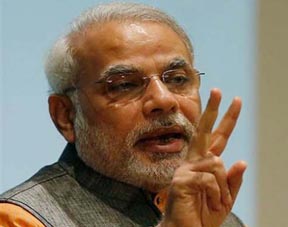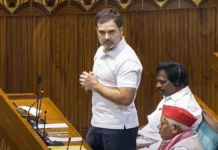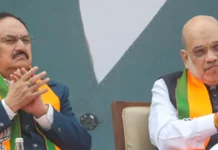 BENGALURU: Stressing that terror and talks cannot go together, BJP today said India’s engagement with Pakistan would be based on strategic interests and enunciated Modi government’s foreign policy pillars or “Panchamrit” of dignity, dialogue, security and shared prosperity and culture.
BENGALURU: Stressing that terror and talks cannot go together, BJP today said India’s engagement with Pakistan would be based on strategic interests and enunciated Modi government’s foreign policy pillars or “Panchamrit” of dignity, dialogue, security and shared prosperity and culture.
In the first-ever separate resolution on foreign policy brought in its National Executive here, BJP attacked the previous Congress-led Government, saying “a cursory glance at the ‘lost decade’ of the UPA, reveals retreat and a loss of direction in engaging with neighbors, ham-handed diplomacy vis-a-vis Pakistan and a blind-spot in our foreign policy to the Indian Ocean island states.”
It lauded the Narendra Modi government’s initiatives taken on foreign policy, including the Prime Minister and External Affairs Minister Sushma Swaraj’s continuous engagements with world leaders in the last 10 months.
On Pakistan, the resolution said, “We have laid out a clear policy for building peaceful and friendly relations with Pakistan, predicated on an end to terrorism.”
“There can be no compromise with terrorism. There can’t be any duplicity towards a problem that has become a regional crisis and is fast becoming an international nightmare.”
“All outstanding issues with Pakistan can be resolved through bilateral dialogue in an atmosphere free from terror and violence,” it said.
It said the national ambition is “Bharat’s rise as a strong and respected world power” for which the government has adopted “Panchamrit”.
It spelt out ‘Panchamrit’ or 5 ‘S’ of the country’s foreign policy as ‘Samman’ – dignity and honor; ‘Samvad’ – greater engagement and dialogue; ‘Samriddhi’ – shared prosperity; ‘Suraksha’ – regional and global security; and ‘Sanskriti evam Sabhyata’ – cultural and civilization linkages, the party said.
The BJP said Modi has pursued “a bold, proactive and innovative foreign policy that is aligned with our Government’s primary goal of accelerating national economic development; and to fulfill Bharat’s global responsibilities as the world’s most populous youth nation and largest democracy.
The entire resolution described the country as ‘Bharat’ instead of India.
The resolution criticized the previous UPA government’s approach in dealing with the international community, saying during the last decade it tended to weigh the nation down when New Delhi punched substantively below its weight in pushing through its foreign policy objectives, while often appearing side-lined in the international arena.
The UPA dispensation seemed grossly incapable of molding Bharat’s foreign policy, national security and economic development imperatives into a composite and coherent policy framework, it alleged. “Our government has, in a short span of ten months, transformed foreign policy into a major instrument to realize our national ambition of Bharat’s rise as a strong and respected world power,” the resolution said.
Party Spokesperson M J Akbar, who also spoke on the resolution, told reporters that Parliamentary Affairs Minister M Venkaiah Naidu proposed it, while Swaraj summed up the foreign policy initiatives of the government that have helped the country emerge as a global power.
On Pakistan, Akbar said that “terror and talks cannot go together.”
The resolution said India has responded firmly and appropriately to provocations on the border and Line of Control and threats of infiltration and terrorism and the Prime Minister’s message to his counterpart on the occasion of Pakistan Day has been unambiguous that “all outstanding issues with Pakistan can be resolved through bilateral dialogue in an atmosphere free from terror and violence”.
The resolution further said, “Visit of our Foreign Secretary to Pakistan as part of the SAARC Yatra is a clear message to our neighbor that Bharat will engage with it only on such terms that reflect its national security and strategic interests.”
Modi Government has indicated that it will be revisiting institutions and policies.
‘Panchsheel’, enunciated by Jawaharlal Nehru, has been the defining doctrine of Indian foreign policy for decades.
The five principles are mutual respect for each other’s territorial integrity and sovereignty, mutual non-aggression, mutual non-interference in each other’s internal affairs, equality and mutual benefit and peaceful co-existence. The resolution also noted that the Prime Minister filled a long gap in many bilateral relations with visits to – Nepal after 17 years, Sri Lanka after 28 years, Australia after 28 years, Fiji after 33 years and Seychelles after 34 years.
Noting that despite “romantic sloganeering”, Bharat’s neighborhood policy has largely remained lackluster in the past decade, the resolution said, “Our excessive tilt in one direction left many countries in the neighborhood apprehensive. The fact that we face innumerable problems with almost all our neighbors is evidence that we had not engaged with the neighborhood properly in the past.”
Recalling that the previous NDA regime led by A B Vajpayee had initiated a marked positive shift in neighborhood policy when relations with Myanmar, Bangladesh and Pakistan were sought to be improved, it said, “that shift has now been furthered strengthened with a purposeful focus on the neighborhood”
On Sri Lanka policy, it said it had suffered several ups and downs in the last three decades. A short-sighted approach by the previous government, guided by domestic political ambitions, damaged bilateral relations leading to strategic problems in the immediate Indian Ocean neighborhood, it said.
Modi’s determined effort at repairing these relations had resulted in a flurry of activity on both sides, it said.
“Our government has rebuilt relations with all sections of the Sri Lankan society. Our Prime Minister became the first Prime Minister of Bharat to visit Jaffna. He invoked his idea of cooperative federalism and stressed upon the 13th Amendment and beyond.”
“With Nepal, we have entered a new era of cooperation that has eluded us for decades.,” the resolution said, noting among others that nearly two decades after signing the Mahakali Treaty with Nepal, the Pancheshwar Development Authority had been constituted for the 5600 MW multi-purpose Pancheshwar Project, which will provide power, water and flood control benefits.–PTI





